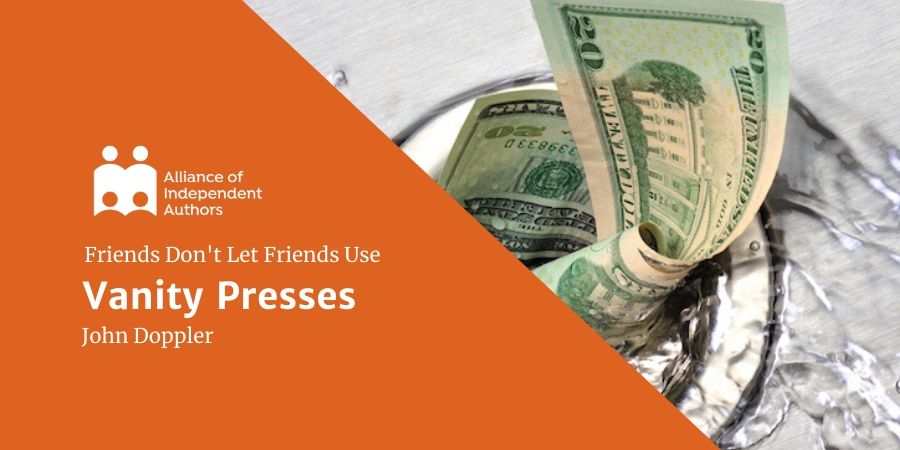Many of us have firsthand experience with an exploitative vanity press, so when we see a friend falling prey to that same seductive sales pitch, it's especially heartbreaking.
Vanity presses are frequently substandard publishers and incompetent marketers — but they are masters of manipulation. They have honed the art of the sales pitch to a fine edge, and they know exactly what buttons to push to appeal to a novice author's hopes and insecurities. The end goal is not to sell books to readers, but to sell overpriced services to authors.
So how do you explain the reality to an author who desperately wants to believe the sales pitch? Negative reviews and watchdog ratings can only go so far to dissuade someone from stepping off that cliff. But there's an easy way to demonstrate that a vanity press is a poor deal for the author: show them the results.
I've examined some of the worst offenders in that shadowy corner of the publishing industry. For each, I've gathered a random sampling of twenty titles on Amazon. To be included in the analysis, a book must be currently available in paperback, and in print for a minimum of six months. By finding the median number of reviews and the sales ranks for those books, we get a snapshot of how the typical vanity press publication performs in the real world.
The results were shocking.
Sales rank is Amazon's measure of how well a book is performing compared to other titles. The larger the sales rank number, the worse it is performing. How do vanity presses stack up?
Sales Rank
The table below shows the median sales rank for these companies. But pay close attention to the N/A column. That's the percentage of books whose sales were so bad, Amazon was unable to calculate a sales rank for them.
| Company | Median Sales Rank | N/A |
| Pegasus Elliott Mackenzie | 5,728,036 | 45% |
| Austin Macauley | 4,850,732 | 45% |
| Xlibris | 5,776,290 | 30% |
| Christian Faith Publishing | 3,430,204 | 20% |
| Page Publishing | 3,262,395 | 15% |
Of the books I surveyed, nearly half of the ones published by Pegasus Elliott Mackenzie or Austin Macauley last year have no meaningful sales. One third of Xlibris titles are dead in the water. One in five from Christian Faith Publishing fail to generate sales.
To get a basis for comparison, I ran the numbers for two popular independent publishers, one using a traditional publishing model, and the other a hybrid publishing model. Both scored three times higher than the “best” vanity press above. And, more significantly, not one of the books examined lacked a viable sales rank.
| Company | Median Sales Rank | N/A |
| Indie Publisher A | 1,114,172 | 0% |
| Indie Publisher A | 1,134,710 | 0% |
Reviews
I chose to focus on the quantity of reviews rather than the scores. We're not concerned here with the quality of the writing, but rather, how many people are purchasing these books and reviewing them. The number of reviews is an imperfect metric at best, but it can spotlight some obvious failures in the publishing process.
And failures abound where vanity presses are concerned.
| Company | Median Number of Reviews | Books Without Reviews |
| Christian Faith Publishing | 0 | 75% |
| Austin Macauley | 0 | 65% |
| Xlibris | 1 | 65% |
| Page Publishing | 0 | 50% |
| Pegasus Elliott Mackenzie | 1 | 45% |
The numbers above barely convey the magnitude of just how horrifically inadequate these publishers are. After months of exposure, three out of four books published by Christian Faith Publishing failed to generate even a single review. Well over half of Austin Macauley and Xlibris publications had no reviews whatsoever.
But how did the legitimate publishers compare?
| Company | Median Number of Reviews | Books Without Reviews |
| Publisher A | 73 | 0% |
| Publisher B | 23 | 0% |
Every book we examined from our two control group publishers had reviews. And while the number of reviews ranged from a handful to hundreds, the overall pattern was clear: the neglect shown by the vanity presses stands in glaring contrast to the overall success of a legitimate publisher.
The authors who hired these questionable services wasted thousands of dollars on a book that's now invisible, unread, and consigned to the lowest levels of Amazon's sales rank. Those authors will likely never recoup their costs.
Performing Your Own Test
You can apply this same informal test to the publisher of your choice. First, run a Google search like the one below, substituting the company's imprint:
+site:amazon.com +”Publisher: Exploitative Press”
Now click through each of the search results, and see how many reviews they've gathered, and what their sales rank is. If the majority of books you examine have few (or no) reviews, and their sales ranks are abysmal, you'll have a good indication of what kind of publisher you're dealing with.
Over to You
Do you have a friend who was considering a vanity press? How have you helped steer them in the right direction? Let us know in the comments below!
#IndieAuthors beware: vanity presses are so much worse than you think. - by @johndoppler Click To Tweet




First off, I submitted my manuscript to Pegasus without knowing who they were. I got a contact back from them, which sent me to Google and I read your warnings. Thank you for your advice.
Since I submitted my manuscript to Pegasus and do not intend to follow through with them,
Do I have to worry about my work being pirated?
Thanks once again
Tom
Thanks for calling this out. But I think your account, while accurate, is somewhat misleading. Yes, the manipulative vanity presses out there are a danger to our entire industry. Taking money and implying results that cannot possibly be guaranteed is unethical. No disagreement there.
However, implying a vanity press is bad merely because their books rank poorly only addresses the marketing side of publishing—and ignores the fact that, even for successful traditional publishers, much of this marketing burden, and the ultimate success or failure of a book, falls on the author.
By your standards, self-published books, the vast majority of which also have low sales ranks and limited reviews as well, are just as bad. But yet we know there are many, many examples of wonderful success stories in the DIY world.
The reality is that, to achieve a good sales ranking, a book must be well written, well edited, well designed, well promoted, and well timed, regardless of the publishing model used. Any of the routes—DIY, service provider, “vanity,” hybrid, or traditional—CAN succeed or it CAN fail.
I think being clear that these manipulative vanity presses fail not just in marketing, but in editing and design as well, will help prime authors to better understand the choice they are making when deciding what approach to publishing best serves their needs.
And I applaud ALLi, IBPA, and all the publishing organizations and service providers out there who work to raise awareness of the harsh reality that is the world of publishing by promoting and helping to enforce high professional standards.
I was extremely fortunate that I was advised against going down that route by author Debbie Viggiano!
Thanks to her that I aborted my plans and self-published my debut book – The Ivory Towers & Other Stories (Amazon, Dec 2018)
Well done, John! Another thorough piece I’m going to share with my viewers.
I tried, I really tried, to convince a friend not to go with the vanity press that was promising them the earth – but they paid thousands up front for a (preposterous) 3 book deal – one of theirs and one from each of their 2 children!!! They paid up even though the books weren’t even finished being written 2 years on they still have no thing to show for their money. Sometimes it’s impossible (sadly) to deflect people from a course of action that they are determined on.